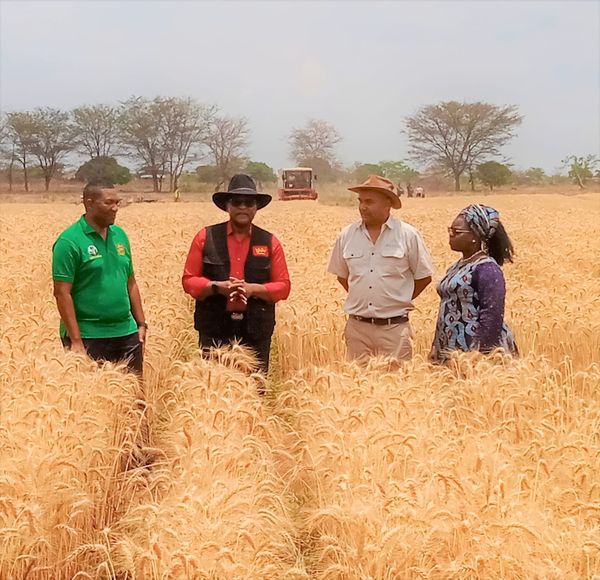By Sylvester Kumwenda

Dowa, October 20: President Dr. Lazarus Chakwera has said Malawi has the potential of becoming a self-reliant country through innovations in sectors like agriculture.
The president made the remarks Friday when he inspected wheat farming activities at Mpale Wheat Farm-Pyxus Agriculture in Senior Chief Chakhaza in Dowa, and also appreciated a harvest of wheat seed being bred at the farm.
Chakwera said the country needs to come up with tangible solutions that address challenges the country is facing, like huge costs of importation of goods like wheat, which drains the country’s forex and renders prices of byproducts high.
“When we innovate in wheat production, we are sure that in the long run, we will be able to meet a huge part of the country’s wheat demand, reduce costs of products and significantly cut on forex externalization, which are all crucial factors in the development of this country,” said Chakwera.
He commended Pyxus for innovating in multiplying wheat seed whose four brands government recently introduced in Malawi.
He said farmers in mega farms, Shire Valley Transformative Program and other large-scale farmers could have a chance to use the seed which are high yielding and mature in three months.
He then called upon all Malawians to continue working hard and also support interventions that can transform the socioeconomic profile of this country.
In an interview, Dr Alfred Mwenefumbo, Controller of Agricultural Extension and Technical services in the ministry of agriculture said government is committed to looking at different potentials that can reduce the importation of crops consumed in Malawi like wheat.
Chief Executive Officer for Pyxus, Ronald Ngwira, said the company decided to venture into multiplication of the new four brands of wheat because of the potential wheat production the country has.
“I think it is very important for Malawi because the country currently imports $48 million worth of wheat. And 99% of the wheat we use is imported and we only grow 1% of it,
“So, what we intend to do is to is multiply the wheat so that by summer next year, we should have around 150,000 kilograms of wheat seed enough to be cultivated on 15,000 hectares of land. This looks promising and it will be a game changer for the nation,” he said.

